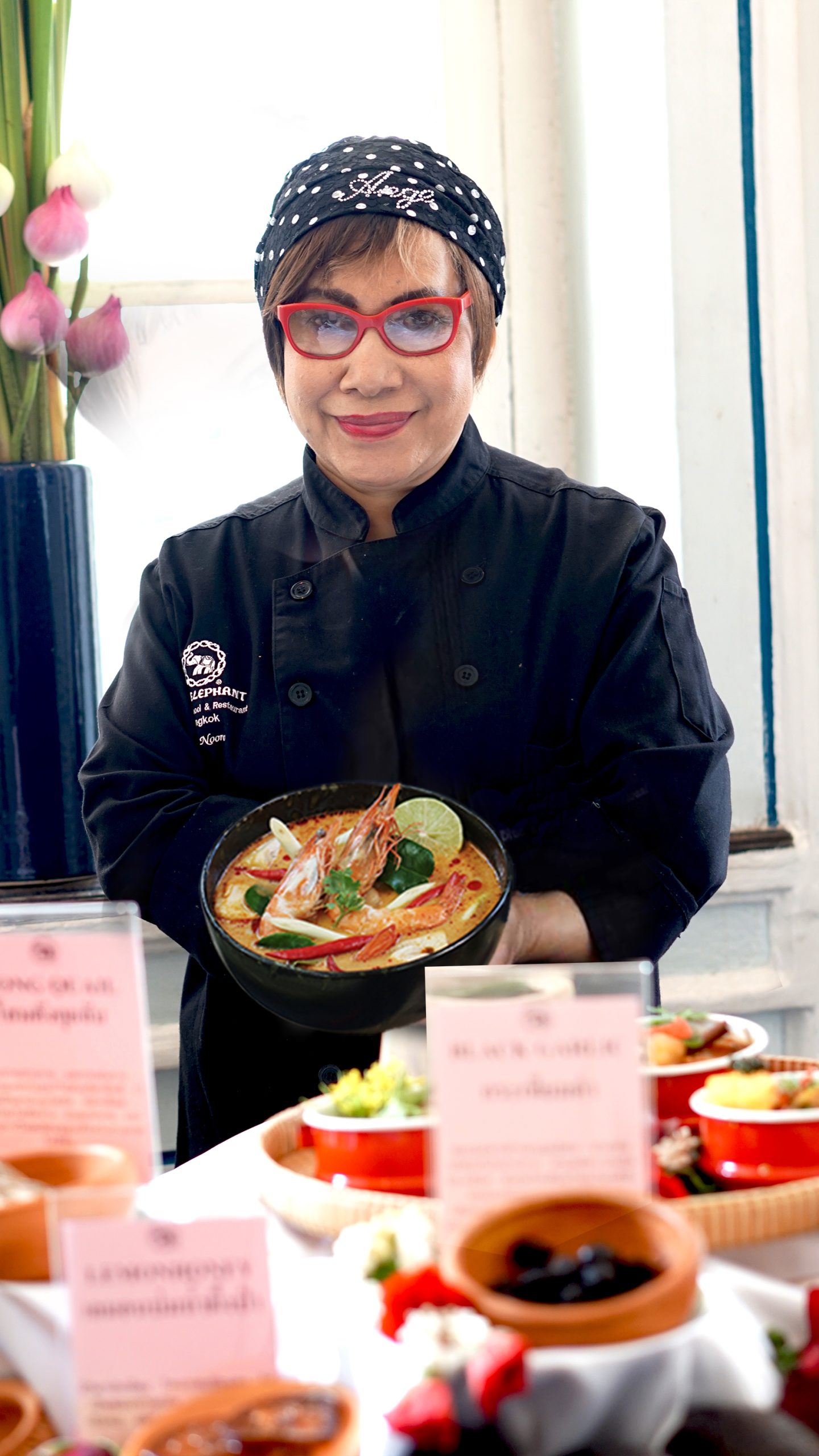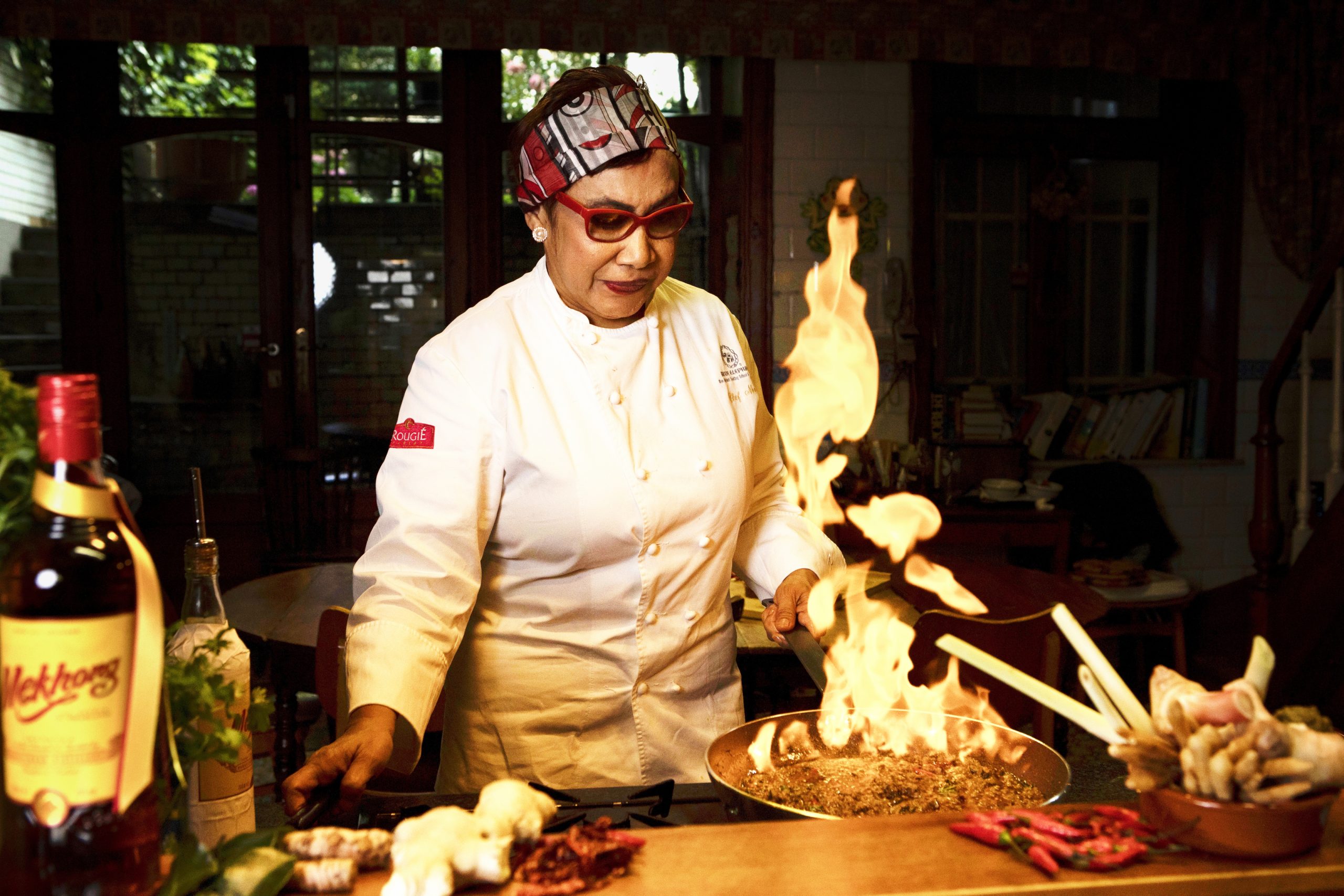Her journey as a culinary ambassador.
By Aiden Jewelle Gonzales
From the Thai government’s Global Thai campaign as part of their ‘gastrodiplomacy’ policy in the 2000s, during which they invested in Thai restaurants worldwide to promote goodwill towards the Kingdom; to Thai rapper Danupha ‘Milli’ Khanatheerakul eating Khao niew ma muang to an audience of thousands at Coachella, thus propelling the dish to viral fame; food has always been an integral component of soft power. Transcending race, national borders, class, and creed, food brings communities together, while also introducing us to, and helping us appreciate, new cultures.
This is a concept that has been taken to heart by Nooror Somany Steppe, the powerhouse behind Blue Elephant Heritage Thai Cuisine, who has been lauded as a Thai culinary ambassador to the world. While many of us Bangkokian foodies will recognise the brand as the one behind the luxe and iconic Blue Elephant Restaurant in Sathorn, I was intrigued to learn that this was only the tip of the iceberg of their culinary achievements. Aside from three other restaurants in Phuket, Malta, and Denmark; Blue Elephant also has cooking schools in Bangkok and Phuket; and their manufacturing arm, Blue Spice Factory, exports its Thai Premium Grocery Line products to 43 countries in almost every continent worldwide. From Thai dressings and sauces, to curry pastes, dried spices, cooking sets, snacks, noodles, and more; their products have been arguably instrumental in promoting Thai food as a globally-accessible and beloved cuisine. The products are especially popular in India, which has seen growing appreciation of Thai cuisine in recent years; and in fact, Blue Elephant has also introduced a line of Indian products, another way of promoting closer Thai and Indian cultural ties.
Despite these achievements, Nooror, with her trademark idiosyncratic glasses, no-nonsense charm, and ever-present smile, remains humble and aware of her modest roots. “My cooking skills came from my mother,” she recalls. “But I learned heritage Thai cuisine from my guru and chef, Ajarn Srisamorn Kongphan in Kasetsart University, where I also graduated from my Master’s degree.” Without mincing words, she tells me, “After marrying Mr. Karl Steppe and moving to Brussels, I used to cook a lot for family, friends and customers in Brussels. After they tried my food, they suggested that I open a restaurant. So, in 1980, I started Blue Elephant there. Then London, Paris, Copenhagen.” The rest, clearly, was history. When it comes to their Premium Grocery Line, she emphasises the importance of only using top-quality ingredients from Thailand. “Our production only uses premium Thai ingredients for our curry pastes; of which our specialities include green, yellow, and red curry pastes,” she explains. “We have a range of certificates that guarantee our quality all around the world.”
She spoke to Masala further about what sets her products apart, and why she believes Thai cuisine – and culture – is becoming increasingly popular in India, and vice versa.
Aside from your premium Thai products, you also sell some Indian products. How did that come about, and which markets they’re especially popular in?
First of all, I would like to thank the Taj President hotel (now Vivanta by Taj – President, Mumbai) which allowed me to learn Indian cuisine, and also the family of my best friends in Mumbai. After having learnt how to cook Indian cuisine, I started my Indian restaurant in Brussels and London, named La Porte des.
But I wanted to carry on this knowledge further so I started Indian curry pastes such as our Tikka masala paste and Butter paste products, and these and other Indian menu items are sold in famous department stores in Bangkok, such as Siam Paragon and Central Chidlom.
Your brand seems to be incredibly popular in India. What do you think sets your products apart and makes them so well-received in the Indian market?
It’s been thanks to Indian distributors and customers who’ve visited my restaurant in Bangkok and Phuket, and who are the greatest promoters of our food. Moreover, our Blue Elephant Restaurants and Blue Elephant Thai Premium Grocery Line has choices of food for vegetarians, which is important to the Indian community. We also do catering for big Indian weddings in India, which has helped to promote our food.
How has the reception been in Thailand compared to India? Which products are the most popular in each of these markets?
In my opinion, Indians love our range Thai curry pastes, spanning green, red, and yellow curries, as well as our Phad thai products.
There are also a range of Indian restaurants that have opened in Thailand now, which means that the cuisine is now even more popular for the new generation of Thai people. Now, many Thai people love Indian food.
Thai curry pastes and sauces are known for their complexity and authenticity. How do you ensure that your products maintain the traditional flavours while catering to a global audience?
I’m Thai, so of course I love to present only authentic Thai curry pastes to our customers. Although our brand has grown from just a small business to a global brand, I still try to ensure that I find the right balance in the taste of the ingredients, herbs, and spices, so our customers can get the best, most authentic products.
We are also committed to using only quality ingredients in all our products. In our Thai curry pastes, we use a lots of fresh ingredients such as galangal, ginger, kaffir lime, and few dried spices.
As a global brand, how do you approach tailoring your offerings to suit the taste preferences of different regions and cultures while maintaining your brand identity?
In our Thai range, we only sell real, authentic, Thai Cuisine. Although each country and region loves different flavours, overall there is something for everyone. For example, I know that our customers in the US love yellow and green curry, without too much coconut milk, and more sauces, and we accommodate that. So we’re flexible to the customer needs in each country, but we always only serve heritage Thai recipes.
Moreover, while India is a diverse country with a wide range of regional cuisines, one way to appeal to many of the communities there is that our curry pastes are vegetarian. So those products are great for consumers in different parts of India. I also get a lot of requests to do catering services in India, and this helps us tailor our products to different regions.
All our products are also available online, so no matter your preferences, customers can easily buy them no matter where in the world they are.
Sustainability and ethical practices are becoming increasingly important to consumers. Can you share some initiatives your brand has taken to promote sustainability and support local communities in both Thailand and India?
We try not to use too much plastic in our packaging. A big part of sustainability is using local ingredients, and we get our ingredients from local farms and from the Royal Project Foundation.
How do you manage a global brand, from supply chain logistics to developing new products, and more?
It’s all about teamwork. The success is not only mine, but a big team who does our logistics, marketing, research, and more. They know the preferences of each country, so while I develop the recipes and sauces, I have other teams who take care of other aspects of the business for me.
Finally, can you give us a glimpse of your vision for the future of Blue Elephant Royal Thai Cuisine, particularly in terms of expansion and innovation?
We’re very busy at the moment, but we eventually want to expand the Blue Elephant Restaurant franchise in more countries, and develop new recipes. We’re looking forward to that.









